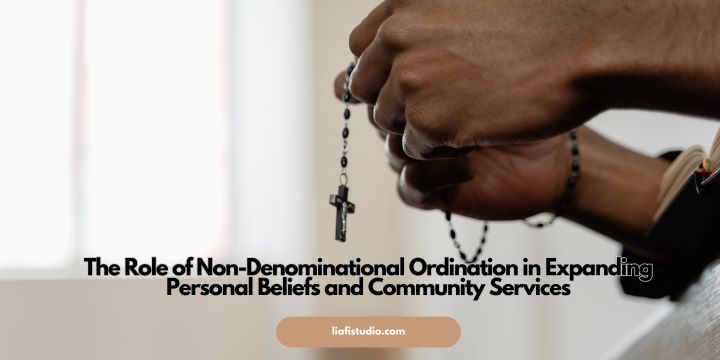Key Takeaways
- Inclusivity and adaptability are central to non-denominational ordination, focusing on personalized spiritual services.
- Non-denominational ministers serve as critical social anchors, offering guidance that transcends religious borders.
- Through community engagement, these ministers forge bonds of solidarity and understanding.
- Ordination facilitates personal growth and development, encouraging a deeper understanding of the community’s spiritual landscape.
- Ministers must consider legal considerations and ensure their services comply with regional laws.
- While diverse, the ordination process aims to prepare individuals for their roles’ practical and spiritual responsibilities.
Table of Contents:
- Diversity in Beliefs and Inclusivity
- The Social Role of Non-Denominational Ordination
- Community Engagement and Support
- Fostering Personal Growth Through Ordination
- Legal Aspects of Performing Ceremonies
- Understanding the Ordination Process
- Real-Life Examples of Non-Denominational Ministers’ Impact
- Conclusion
In an ever-diversifying society where individual beliefs are as varied as the people holding them, the role of non-denominational ordination in serving community needs has become increasingly prominent. This ordination allows individuals to officiate ceremonies and provide guidance without adherence to a singular religious denomination, thereby contributing to inclusivity and personal spiritual fulfillment.
Diversity in Beliefs and Inclusivity
Modern society’s melting pot of cultures and belief systems demands an adaptable approach to spirituality. Non-denominational ordination stands as a beacon for this adaptability, enabling officiants to conduct ceremonies not constrained by any specific religion’s doctrines. This fosters a welcoming environment where people of different or no faiths can participate in meaningful life events like naming ceremonies, weddings, and funerals. Those who pursue non-denominational ordination are often driven by a desire to celebrate the uniqueness of each person’s beliefs, creating customized experiences that resonate deeply with the participants’ values and script their stories onto the fabric of their most cherished memories.
The Social Role of Non-Denominational Ordination
Non-denominational ministers fill an essential social niche by reaching out to serve communities in ways that transcend traditional religious divides. They often emerge as community leaders, participating in local events, providing counseling, and serving as mediators in times of conflict. The non-denominational minister offers a bridge of understanding in a world where interfaith relationships and multicultural interactions are shared. By venturing outside the walls of religious institutions, these ministers are uniquely positioned to minister to the needs of all community members, not just those with the same views. This strengthens the basis of a cohesive community.
Community Engagement and Support
Ordained non-denominational ministers engage in various community services, underlining their significance beyond the traditional scope of religious functions. Their involvement can range from spearheading educational programs to designing community support systems for the underserved. They assiduously strive to fortify the bonds that unite neighbors by organizing events celebrating similarities and differences. Community engagement becomes not only a duty but a heartfelt commitment to enhance the lives around them. Through this personal touch, ministers embody a living example of how individual actions can positively influence a larger society.
Fostering Personal Growth Through Ordination
The path to becoming a non-denominational minister often catalyzes considerable personal development. As individuals explore their spiritual ideas and learn how to manage the responsibilities of their role, they cultivate vital qualities such as empathy, leadership, and public speaking. This journey is marked by a deep understanding of the diverse beliefs within the community they serve, enabling them to connect authentically with individuals from various backgrounds. The growth that accompanies non-denominational ordination is not limited to spiritual enrichment—it also involves the continuous development of skills related to creating and maintaining community ties and exploring the true essence of servitude.
Legal Aspects of Performing Ceremonies
Aspiring to become a non-denominational minister has its legal intricacies. For ceremonies to be recognized officially, one must navigate the jurisdiction’s regulations, which vary from region to region. This may entail registering as an officiant, maintaining records, and understanding the legal implications of conducting the ceremonies. Each state or country might have different requirements for a legally binding marriage; for instance, those ordained must be well-versed in the appropriate procedures to fulfill their role with spiritual and legal legitimacy.
Understanding the Ordination Process
The ordination process to become a non-denominational minister varies by the organization one chooses to be ordained. Generally, the process requires filling out an application, sometimes accompanied by education prerequisites or ethical training. A central theme in the process is a commitment to inclusivity and respect for all spiritual paths. This journey is not taken lightly and often reflects a profound sense of calling. Through the ordination process, individuals are granted the privilege and responsibility of crafting and leading ceremonies that honor the sacred milestones of life across cultural and religious spectrums.
Real-Life Examples of Non-Denominational Ministers’ Impact
The quiet influence of non-denominational ministers is woven into the life stories of many individuals and their communities. Whether uniting two lives in marriage, commemorating the life of a loved one passed, or providing guidance to those in need, non-denominational ministers are often synonymous with moments of deep personal significance. They offer a unique comfort, knowing that the spiritual essence of these experiences is translated through rituals that honor the varied tapestry of beliefs that define our society. Through their service, they contribute to a world where diversity is not simply tolerated but celebrated with gusto.
Conclusion
Non-denominational ordination represents a transformative development in spirituality and community service. By fostering an inclusive and flexible approach to ministry, it allows individuals to explore and expand their personal beliefs while addressing the varied needs of their communities. Despite its challenges, its to create a more inclusive and responsive spiritual landscape is profound. As society continues to evolve, the role of non-denominational ministers in promoting unity, understanding, and compassion will undoubtedly become increasingly significant.








